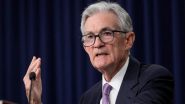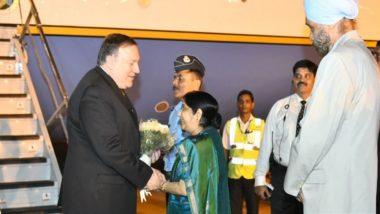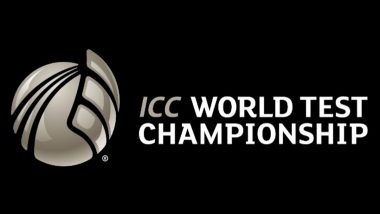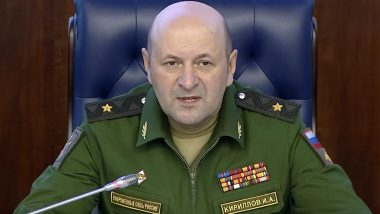U.S. Secretary of State Mike Pompeo arrived in New Delhi last evening and was received by his Indian counterpart Sushma Swaraj. Pompeo along with U.S. Defence Secretary James Mattis are in New Delhi for the 2+2 dialogue which will be the highest level discussion between the two countries this year.
The U.S. and India have "big and strategic" items to discuss during the first 2+2 Dialogue, according to Mike Pompeo. The format of the dialogue has been delayed twice this year.
"We have a true strategic partner who, frankly, is our only 'Major Defence Partner', the only designated 'Major Defence Partner', with whom we have a great relationship and who is very important to our success in our Indo-Pacific strategy enormous country with incredibly opportunity and capacity for wealth creation,” Pompeo said ahead of his visit.
Indo-Pacific
Earlier this year, U.S. Defence Secretary Jim Mattis, announced that the U.S.’ Pacific Command will now be called the U.S. Indo-Pacific Command. The name change, is being seen by observers as a tactical move against Chinese military and economic hegemony in the region. The move by the U.S. highlighted the increasing significance of India in Washington’s strategic thinking and also marks India’s re-entry to the American government’s “Asia Nexus.”
The renaming as well as bringing India into the fold as a strategic partner is taking place amid Chinese People's Liberation Army flexing its muscles in the Indo-Pacific region. Hence, a major focus of the 2+2 dialogue is going to be ensuring that the Indian Ocean and the South China Sea lanes, remain unthreatened by Chinese aggression. Earlier this week, Randall Shriver, senior US official in the Pentagon said Chinese behavior was increasingly a matter of concern, because it included “coercive approaches towards internal politics of others,” indicating “they have a different aspiration for the region."
The U.S. government had said in April that its vision is of a free and open Indo Pacific, which is supported by India.
COMCASA agreement
Thursday’s discussion is likely to evaluate the landmark agreement on communication and coordination on security issues – COMCASA and sale of high tech military items. The Hindu had reported on Monday that both sides are likely to fall short of formally signing the COMCASA document.
The COMCASA agreement will allow exchange of secure communication between the two militaries and facilitate the sale of high tech encryption systems to India. Some experts have cautioned that signing the deal might expose India’s critical security communication to the United States.
Counter ISIS Finance Group
The Indian Express reported that Washington is learnt to have suggested that New Delhi should be a part of the Counter ISIS Finance Group (CIFG), a broad international group formed to “degrade” and “defeat” ISIS. The group was established in January 2015, and has 49 member states, including Australia, Bahrain, Bulgaria, Canada, Denmark, France, Georgia, Germany, Iraq and China as observers.
The U.S. homeland security officials and their Indian counterparts have worked on a draft plan related to six areas, including anti-terror cooperation in intelligence sharing, terror financing and cyber security, that will be shared during the September 6 dialogue, said officials.
Pakistan
Mike Pompeo comes to India after paying a visit to Pakistan’s newly elected Prime Minister Imran Khan. It is reported that while Pompeo did not directly mention India, through his remarks he placed the onus for peace in the region on Pakistan.
Since Donald Trump assumed charge, Washington has taken an increasingly hardline against Islamabad for its sponsoring and protection of radically Islamic groups which give overt and covert support to terror groups. Just before Pompeo landed in Islamabad, the Trump Administration announced a further halting of $300 million in aid that was to be given to Pakistan.
“In all of his meetings (in Islamabad), secretary Pompeo emphasised the important role Pakistan could play in bringing about a negotiated peace in Afghanistan, and conveyed the need for Pakistan to take sustained and decisive measures against terrorists and militants threatening regional peace and stability,” state department spokesperson Heather Nauert said.
Russia
The U.S. has grown as a major defence partner for India and it is India’s second largest arms supplier. U.S. arms imports increased 557% between 2008–12 and 2013–17 but Russia remains India’s biggest arms supplier.
India is currently in the final negotiation stages to purchase Russia’s state of the art S-400 air defence systems. But the U.S. has imposed sanctions on Russia for its annexation of Crimea under which countries that do business with Russia will also be sanctioned.
India has been in talks with the Trump Administration to receive exemption for its arms deal but ahead of his departure for his trip to New Delhi, Pompeo said that an exemption for India is not a done deal.
Iran
After the Trump Administration pulled the U.S. out of the 2015 nuclear deal with Iran, it has worked to reimpose economic sanctions as well as restrict Tehran’s oil business.
The Trump Administration has set a deadline of November 4 for all countries to stop importing oil from Iran saying, “you either do business with them or with us.” Iran is a major oil supplier to India and this issue is likely to figure in the 2+2 discussions.
Everyone’s eyes from Islamabad to Beijing are going to be on the high-level dialogue taking place in New Delhi as Pompeo set the tone, saying: "We hope we can find opportunities to continue to expand the relationship not only diplomatic and military-to-military but a good set of business relationships as well."
(The above story first appeared on LatestLY on Sep 06, 2018 06:57 AM IST. For more news and updates on politics, world, sports, entertainment and lifestyle, log on to our website latestly.com).













 Quickly
Quickly




















